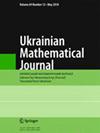局部一元解析函数的一元准则
IF 0.6
4区 数学
Q3 MATHEMATICS
引用次数: 0
摘要
设p(z) = 1 + zϕ″(z)/ϕ ' (z),其中φ (z)是单位圆盘D中的局部一元解析函数,其中φ (0) = φ '(1)−1 = 0。我们建立了最佳常数σ0和σ1的下界和上界,使得\({e}^{{-\sigma }_{0}/2}<\left|p\left(z\right)\right|<{e}^{{\sigma }_{0}/2}\)和|p(w)/p(z)| &lt;\({e}^{{\sigma }_{1}}\)对于z, w∈D,分别表示D中φ (z)的唯一性。本文章由计算机程序翻译,如有差异,请以英文原文为准。
Univalence Criteria for Locally Univalent Analytic Functions
Suppose that p(z) = 1 + zϕ″(z)/ϕ′(z), where ϕ(z) is a locally univalent analytic function in the unit disk D with ϕ(0) = ϕ′(1) − 1 = 0. We establish the lower and upper bounds for the best constants σ0 and σ1 such that \({e}^{{-\sigma }_{0}/2}<\left|p\left(z\right)\right|<{e}^{{\sigma }_{0}/2}\) and |p(w)/p(z)| < \({e}^{{\sigma }_{1}}\) for z, w ∈ D, respectively, imply the univalence of ϕ(z) in D.
求助全文
通过发布文献求助,成功后即可免费获取论文全文。
去求助
来源期刊

Ukrainian Mathematical Journal
MATHEMATICS, APPLIED-MATHEMATICS
CiteScore
0.90
自引率
20.00%
发文量
107
审稿时长
4-8 weeks
期刊介绍:
Ukrainian Mathematical Journal publishes articles and brief communications on various areas of pure and applied mathematics and contains sections devoted to scientific information, bibliography, and reviews of current problems. It features contributions from researchers from the Ukrainian Mathematics Institute, the major scientific centers of the Ukraine and other countries.
Ukrainian Mathematical Journal is a translation of the peer-reviewed journal Ukrains’kyi Matematychnyi Zhurnal, a publication of the Institute of Mathematics of the National Academy of Sciences of Ukraine.
 求助内容:
求助内容: 应助结果提醒方式:
应助结果提醒方式:


